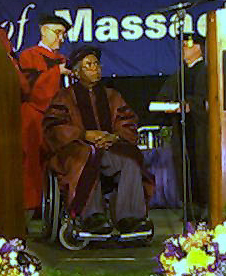Nigerian novelist Chinua Achebe is no stranger to being honored. An internationally celebrated writer whose work has been published in over fifty languages, he was the recipient of the Nigerian National Order of Merit in 1980. He has also been a candidate for the Nobel Prize for Literature.
On Commencement Day, June 1st, UMass Boston joined the respectable ranks of those who have seen fit to honor the artistic and social achievements of this highly influential author, conferring upon him an Honorary Degree in Humane Letters.
Achebe is most well known for his novels, particularly Things Fall Apart, which was first published in 1958 during the Nigerian renaissance, a period of great literary development in Achebe’s home country and one in which he played an integral part.
Things Fall Apart tells the story of the clash between native Ibo village life and British colonialism in the 19th century. That novel, his first, set the tone for what was to come. Throughout his career-and across genres including poetry, short stories, and literary as well as political essays-Achebe has expressed a deep concern for the struggle between tradition and change as well as between native African culture and an intrusive Western culture.
His novels, though written in English, derive their strength from the African oral story-telling tradition. In Morning Yet on Creation Day, a collection of essays published in 1975, Achebe wrote, “art is, and always was, at the service of man. Our ancestors created their myths and told their stories for a human purpose”, and that “any good story, any good novel, should have a message, should have a purpose.”
This commitment to a “human purpose” has led Achebe to become active in more than just literary circles. In addition to being the director of Heinemann Educational Books, Ltd. and of the Okike Arts Centre in Nsukka, Nigeria, as well as the founder and publisher of Uwa Ndi Igbo: A Bilingual Journal of Ibo Life and Arts, he was also deputy national president for the People’s Redemption Party in 1983.
During the Nigerian Civil War, Achebe served on diplomatic missions for Biafra. In 1999, he was Goodwill Ambassador for the United Nations Population Fund. Currently he is a member of, to list just a few organizations, the International Social Prospects Academy of Geneva, the Royal Society of Literature in London, and the Association of Nigerian Authors (of which he is also a founder). Achebe is Professor Emeritus at the University of Nigeria, and, here in the States, has taught at the University of Connecticut and the University of Massachusetts at Amherst.
These are just a few of his credentials. As one reads across the list, one gets a picture of a tireless worker and a towering intellect. It also becomes obvious why UMass Boston would wish to be associated with such a figure. Not only does his concern for the inter-relationships of diverse cultures echo those of many of the students on this campus, but his unflagging dedication to the social value of art, and his application of this value to such diverse forms of cultural discourse, stands as an ideal for those graduates who are looking to apply their hard-won education to a meaningful and socially-beneficial goal in the world outside the university.
To honor Achebe is to honor the commitment to social engagement and growth, it is to honor the struggle for equality and justice, and it is to honor the power of the intellect as a force for good in the world.
Achebe’s novels are already being taught in several departments on campus, encouraging students of varied interests to think more deeply upon the meaning of their own roles in society and culture. It is only too bad that Achebe himself was not given time to speak on Commencement Day, his words would most certainly be worth hearing. Still, there is the hopeful chance that his presence, and the acknowledgement awarded to his achievements, just might encourage a few graduates to take what they have learned and find a way to use it in such a way as to improve the conditions of the world around them, to find, to use Achebe’s words, their “human purpose”.





















































